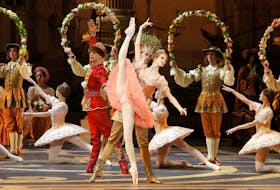'New-found-land’
Poems by Carol Hobbs.
Main Street Rag Publishing, $14, 74 pages.
•••••
Carol Hobbs lives in Hudson, Mass., where she teaches high school, but she’s originally from Newfoundland. My sense is that she doesn’t write a lot of poetry, but she does produce consistently and that work is widely published.
Her writing is also so strikingly triggered by and distilled from her connection to this place that I keep forgetting she actually doesn’t live here anymore. Indeed, this volume opens with a quote from “Quodlibets,” (Latin for “whatever you wish” or “what you will”) by Robert Hayman, the first book written in English in Newfoundland (and what is now Canada). Hobbs’ new collection, nearly 70 pieces, at most a page each, are divided into two sections: “Perfect World” and “Exile.” Already we sense a tone of nostalgia and allegory (one poem is actually titled “Allegorical.”)
She has such a sure, firm, lyrical hand that can guide a poem’s direction in unexpected tracks and slants. In “Listen,” “All children want the treasures blooming under rocks / and wedged like blades in the tree bark. / Their little red hoods weave through the canopy of leaves / like windblown poppies.” All very well, perhaps saving that reference to red hoods, possibly that meant something? Yes, it sure did, for then: “All children lie and lie and scream about wolves. / At the very instant grownups tire, turn away, / the sharp-toothed maw clamps down.”
She has such a sure, firm, lyrical hand that can guide a poem’s direction in unexpected tracks and slants.
With “Travelling Circus / Hall’s Bay, Newfoundland” the “fifty cents” admission buys a ride “(blossoms, delicate satin pagodas, parasols)” where “I was / Sinbad, or Scheherazade in the heat haze of August.” But there is another cost underneath the child’s wonder: “Oh, the elephant’s knees / its immigrant bones.”
Throughout she weighs and adjusts line length, with a honed pacing whose breaks allow resonance to ladder from above to below and back. Many include conversations, with italics indicating dialogue. The formatting also converts from piece to piece: one line, underscored with a stanza of three or four or two; single lines double-spaced; a dozen lines in a denser block.
“Exile” opens with “Exposure,” and the text shimmers and shifts through many layers: “They say when you become cold / enough your body pretends it has slipped / into your mother’s bed and you are / looking anew at the slatted wood ceiling. / The curtains wave like exotic finches, / bright yellow apparitions you do not fear. / They wing through the lilacs of the wallpaper.”
(Hobbs’ mother, her feelings towards her, her memory of her, and her mother’s own stories of her own girlhood, are a-grain-of-sand-in-an-oyster throughline.)
“Heart’s Delight, Heart’s Desire, Heart’s Content” again shows her skill at sluing into and across startling and wonderful avenues. “There was an iceberg so big I had to drive my car / to different vantage points along the shore / to understand something of its perimeter. / It was high, a flat plateau, pristine. / If I lay in the middle of that ice island, I was / a new nation and the edge of it / was a long journey I might prepare for. / Or ignorant of edge, I’d live / all shining at the crystal center …”
“Or ignorant of edge” — what a great phrase. Once you start quoting from a Hobbs’ poem, it’s hard to stop. So let’s going, shall we? “… not seeing those others from the city / line the shore, empty shadowless people / who drove cars around the outside rim. / Headlights were the bowl of stars / I could barely see. I had the perfect, safelist / life, invincible, without any idea of what it was / to fall.”
Organza sleeves, “the scars she has crosshatched into / her skin,” and looming wasps are “folding sorrow / into sorrow” in “The Nest of the Paper Wasp Outside My Daughter’s Window” (“Doesn’t she think / I’ll protect her?”) In “Southerly, Northerly” “I trade my thirst for thirst, / my orchids for salmon, my midnight / for sky, my grief for longing.”
She can even craft a great poem about an earache: “Just a little thing that shakes the whole. / A little thing, sounding / little. It sings to the shell / of my ear with ocean’s / inundation, one hundred thousand waves / smashed in a vain coup, ocean forgetting / the horizon.”
And of the titular “New-found-land”? “Whales did not invent this, / but here they are, / their backs all blade / and anarchy gunwale to gunwale …”
Joan Sullivan is editor of Newfoundland Quarterly magazine. She reviews both fiction and non-fiction for The Telegram.








